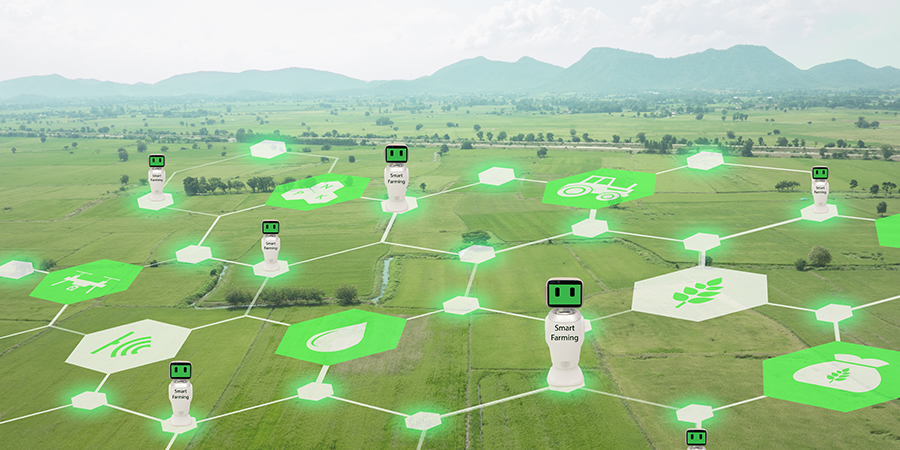The world grows enough food to feed more than 9 billion people which is ideally sufficient for the current population of 7.6 billion. However, almost one-third of the produce is wasted during harvesting, distribution, storage, and transportation.
Especially in the times of the COVID-19 pandemic where an increase in food shortages has been predicted, farmers, businesses and government entities focusing on the offerings of artificial intelligence (AI) to help an important industry such as agriculture is a move in the right direction.
Over the years, there have been major developments in the traditional agricultural processes but the capabilities that AI technology brings are hard to ignore. The globally connected agriculture market size stood at $1.84 billion in 2018 and is projected to reach $7.22 billion by 2026, exhibiting a CAGR of 19.1% during the forecast period. Through collaboration, various connected agriculture solutions, farmers and businesses can enjoy the fruits of cost-effective and efficient food security management through AI.
How does AI work?
In a normal agricultural process, a farmer gathers information about the needs of the plant, assesses the soil condition and according to his estimates, uses the available resources such as pesticides, fertilizers and water to ensure the plant’s growth. AI follows the same process but with revolutionary capabilities through data processing and enabling decision-making. Digitization of data collection processes in the crop fields remains at the core of the agricultural revolution.
Sensors detect the actual needs of the plant such as ideal soil moisture, pH, temperature, humidity, and sunlight that is formatted as a model. The model is processed and the exact requirements for the plants are determined with the emphasis on reducing the use of pesticides and fertilizers.
With a combination of AI and the data gathered by many enabling technologies, farmers and industry experts can act based on accurate information and deep analysis of the entire food production process including harvesting, storage, and transportation facilities to ensure that the produce is not gone to waste.
What’s in it for ICT companies?
Artificial intelligence, predictive analytics, and other technologies are rapidly being adopted in Agtech (agriculture technology). According to data, VC funding for agtech startups worldwide stood at $4 billion in 2019. Despite the economic slump in 2020 due to Covid, investment in agtech is only growing.
“AgTech market will be the next big frontier of growth for the UAE. It's pretty early currently but shows tremendous potential. We estimate that with rising adoption of AgTech, a substantial portion of the country's food imports will decrease aiding better food security,” opines Shahnawaz (Shan) Kadavil, founder and CEO of Freshtohome.com – the largest vertically integrated e-commerce company in the Fish and meat space in the world.
Information technology and network infrastructure service providers today have a golden opportunity to deliver real value by providing a one-stop-shop for all the networks and infrastructure services that are needed to enable the processes related to agtech. Telecommunication companies need to channel their attention in upgrading their offerings of enabling technologies such as sensors, cameras, robots, and drones to deliver high quality and quantity data. To complement AI capabilities of handling large amounts of data and manage multiple datasets, the role of quantum computing is also crucial.
For instance, as part of its national food security strategy to reduce 90 percent of food imports, the UAE government is investing heavily in AgTech for the country’s agricultural sector. Drones or unmanned aerial vehicles (UAVs) have been used extensively for mapping farming areas across the country. The adoption of sensors in the UAE’s agricultural sector has resulted in increased yields in large agricultural projects and a growing number of organic farms. Sensor-equipped gyroscopes, accelerators and GPS monitors are utilized to enhance crop production by making the most of land and water use along with precision irrigation that is highly effective in reducing water waste.
Other technologies such as deep learning algorithms, computer vision and the Internet of Things (IoT) are most suited for agtech. Furthermore, automation combined with artificial intelligence can greatly reduce the use of manual labour for various repetitive work and increase productivity and efficiency.
AI benefits phases
AI can assist farmers to analyze weather conditions, temperature, water usage, or soil conditions collected from their farms to better inform their decisions planning, crop and seeds selection, and resource use to ensure better yields.
The introduction of precision agriculture technologies has helped farmers in detecting diseases in plants, pests, and poor plant nutrition on farms. AI sensors can detect and target weeds and then decide which fertilizer to apply within the right buffer zone. This greatly reduces the over-use of herbicides and excessive toxins that contaminate our foods.
Companies such as Variable-rate technologies (VRTs) are helping farmers with customized crop field management operations and maximizing the benefit of seed selection, reduction of pesticide and fertilizers use whilst making the process cost-effective.
Will AI replace agronomists and robots replace farmers?
The ideal situation would be that the machines should take up all the repetitive activities and humans should take business decisions to provide the most suitable solution for agriculture.
Industry experts suggest that the knowledge of expert agronomists and farmers to provide input for artificial intelligence is crucial to achieving the best results albeit with a slight change in the working patterns.
As intelligent systems continue to disrupt business processes, including agriculture with increased productivity in terms of manual labour, cost-cutting, and time management, ICT companies will be at the forefront of finding and exploring new possibilities. Powerful technologies of cloud, AI, machine learning, and automation are truly the engines of greater profitability and sustainability.










